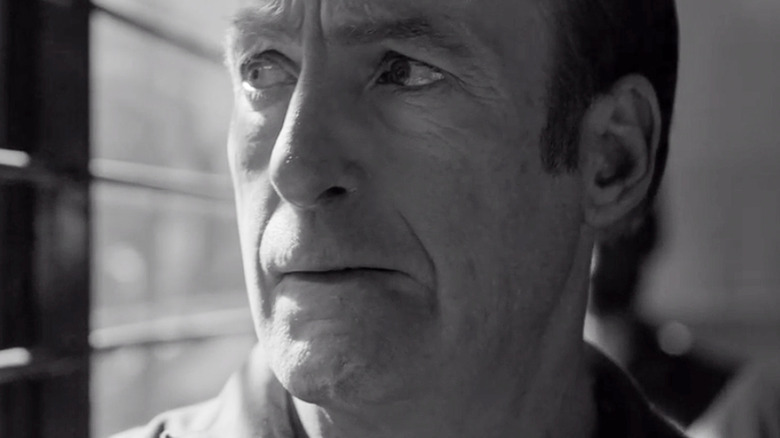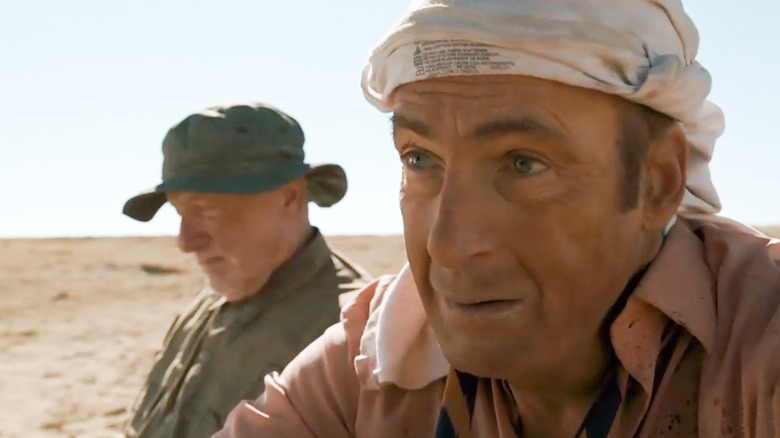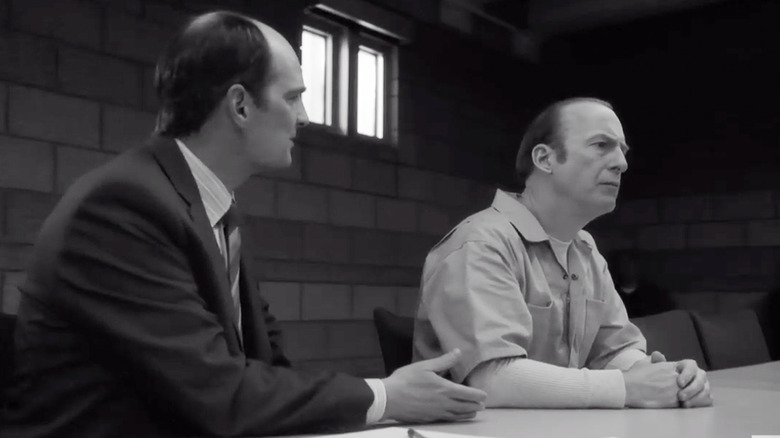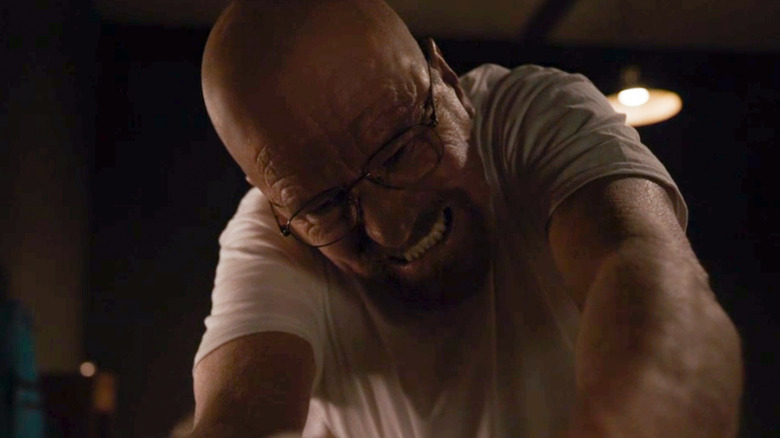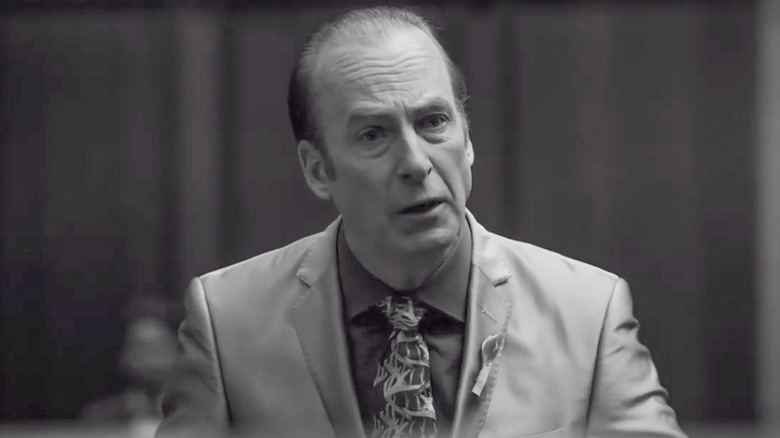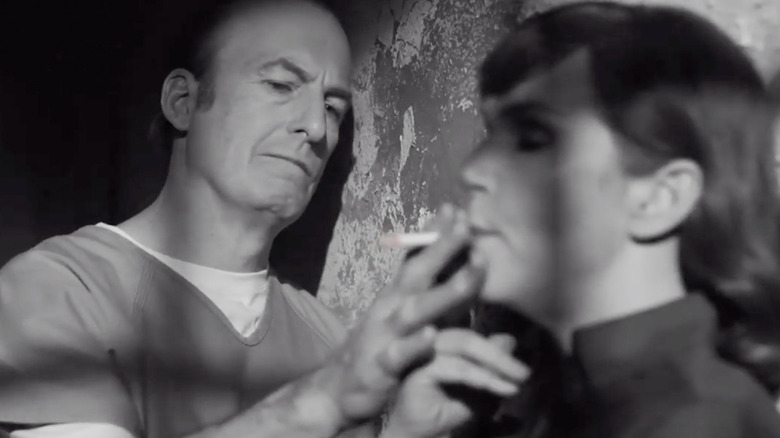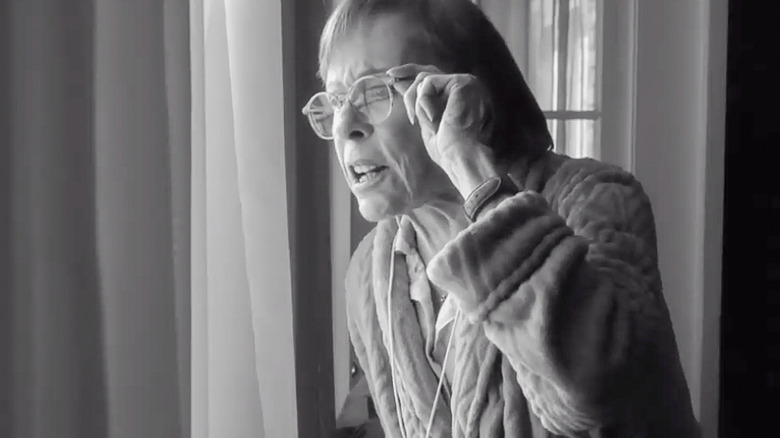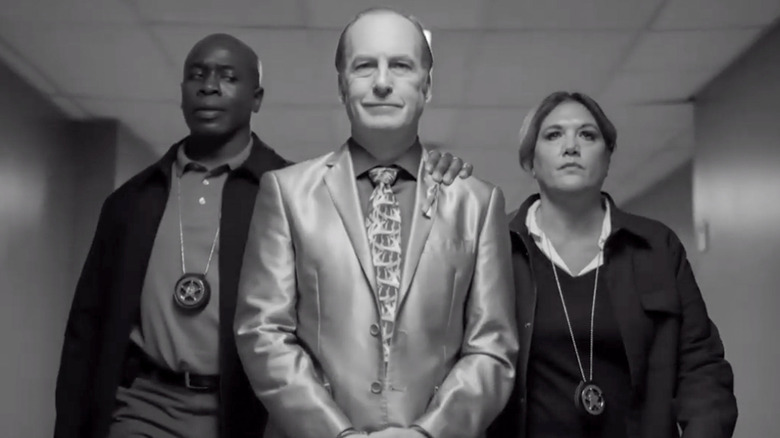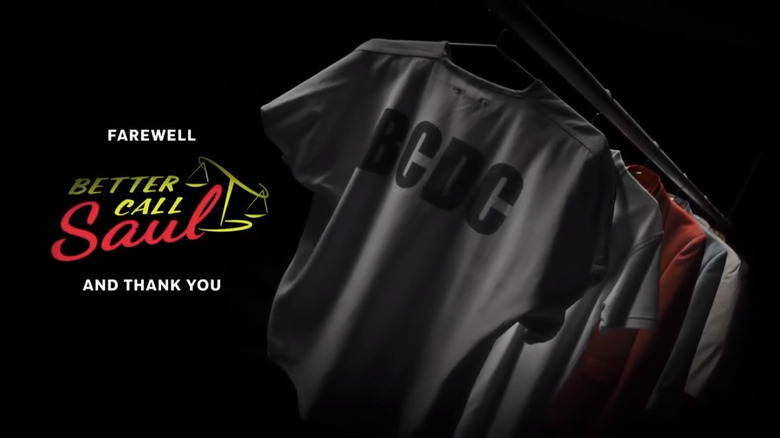Better Call Saul Recap: One Last Smoke
This article contains spoilers for "Better Call Saul" Season 6, Episode 13, "Saul Gone."
Having a favorite show reach the end of its run is like having a group of trusted friends move far away. They remain in memory, and there might even be a special reunion once in a while, but in the end we must move on without our trusted companions. Vince Gilligan and Peter Gould first introduced us to the "Breaking Bad" and "Better Call Saul" universe in January of 2008 and took it away last night with the masterfully assembled "Saul Gone."
They had established a solid precedent with the satisfying ending of "Breaking Bad," with Walter White (Bryan Cranston) freeing Jesse Pinkman (Aaron Paul) and staying just far enough ahead of the police to die from lung cancer instead of a bullet. In "Saul Gone," Gilligan and Gould bring back lots of old faces from the franchise like friends gathering for a going away party. They even carefully lay each interaction out like bookends for us, reversing the order of how each character came into this fictional world in choosing when to send them out.
Saul makes bad decisions both planned and spontaneous
The cold open shows Saul and Mike Ehrmantraut (Jonathan Banks) back on "Bad Choice Road," where, during a rest break, Saul asks Mike how he would use a time machine to improve his life. Mike wants to unwind his tightening scroll of bad decisions completely, go back to when he was a clean cop, and start all over again. Saul just wants to go back to the mid-60s and invest money with Warren Buffett, which greatly disappoints Mike, the most jaded character on either show. Even while literally being weighed down by money Saul wants more meaningless cash, while Mike just wants his son back.
Where Walt managed to elude the police just long enough to die peacefully, in fleeing the tightening net around him Saul finds himself in a dumpster in an alley reminiscent of the one in Chicago where Marco (Mel Rodriguez) suffered his fatal heart attack in Season 1. He huddles there trying to pick up spilled diamonds from among the trash while clutching his emergency go box, which in his most distilled display of ego contains a VHS tape of one of his commercials. The tape at least provides some entertainment for the cops that bring him in, and with nobody left on his side he uses his one phone call to let his staff at Cinnabon know that Gene Takovic won't be coming in to work anymore.
As usual, Saul takes the roundabout way to get where he wants
Saul reaches out to another familiar face, old Albuquerque legal adversary Bill Oakley (Peter Diseth), to act as his legal advisor. He wants to serve as his own attorney, ignoring the advice William De Britaine gave in 1682 and many have paraphrased since: "He who will be his own Counsellor, shall be sure to have a Fool for his Client." But whether he is going by his given name of James McGill, slithering along as Saul Goodman, or burrowing deep into Omaha Cinnabon-land as Gene Takovic, this is a man who seems to come alive in a crisis, and he seizes one final chance to make things right.
That's not how things look at first. In his plea negotiation with federal prosecutors and special sit-in guest Marie Schrader (Betsy Brandt), Saul is back in courtroom performance mode, with a sincere-sounding story about meeting Walter White and being instantly paralyzed by fear for his life. Assistant federal DA George Castellano (Bob Jesser) sees right through Saul's sob story, and Marie delivers the first of the perfect lines handed to the series finale's returning guests. "They tell me they found you in a garbage dumpster," she tells him. "Well that makes sense."
We get one last dip into the world of Breaking Bad
Walt is back too, this time in a flashback to when he and Saul shared a room underneath Best Choice Vacuum waiting for the coast to clear. There Saul poses the same time machine question to Walt, who by now has lost all patience with everyone and no longer hides his open contempt for the man who kept him out of prison for so long.
He sees the question for what it is, a referendum on regret, and for the first time shares with Saul his story of being shut out of Gray Matter by Gretchen (Jessica Hecht) and Elliott Schwartz (Adam Godley). Saul responds with a dumb anecdote about a failed slip-and-fall scam during his small-time Chicago days, prompting Walt to let loose with his capstone line: "So, you were always like this." It's a dig that cuts deep, tracing the line from Slippin' Jimmy through Saul Goodman to Gene Takovic, all of whom threw ethics and good sense out the window to pursue riches and small-scale fame.
Saul's loud clothing is back, but he's quieter inside it
Saul draws Kim Wexler (Rhea Seehorn) out of her zombified life in Florida by hinting to a federal Marshal that she is as culpable for the death of Howard Hamlin (Patrick Fabian) as he is. At first this seems like the contemptible act of a vindictive man, but despite showing up in a classic Saul Goodman shiny suit, he lays his heart and record bare in court. He confesses to being not a victim of Walter White, but his consigliere. Saul's old courtroom theatrics are back along with the suit, although the black-and-white palette softens its visual impact and his usual intensity is subdued by the gravity of his words.
After casually insulting the judge Saul spills a giant vat of beans, clearing Kim's name in the process. He admits, "I was more than a willing participant. I was indispensable ... I conspired with [Walt], and I made millions." It's perfectly reminiscent of Walt's moment of true honesty in the kitchen of Skylar's (Anna Gunn) apartment in the "Breaking Bad" series finale, "Felina," where he confesses to building his empire not for his family but because he enjoyed it. It's also Saul's one last courtroom performance, and it frees Kim but pushes his negotiated seven-year sentence up to a life-ending 86.
Jimmy and Kim get to have one last cigarette together
While they are thematic twins, "Saul Gone" and "Felina" are tonal opposites. Where the "Breaking Bad" finale was violent and action-packed, "Saul Gone" sees not a single drop of blood shed, and the most chaotic moments aside from Saul's initial run from the police come in the courtroom when three people try to talk at once. Instead of a bunch of massacred Nazis and Jesse crashing Todd's (Jesse Plemons) stolen El Camino through a gate to freedom, "Better Call Saul" ends with a couple of nearly silent Jimmy and Kim bookends: the two sharing a smoke while leaning up against a wall, and her later walking away from the prison under playful fire from his stoically deployed finger guns.
The shared cigarette is a direct callback to the first time we saw them in private together, smoking outside the HHM building in the series premiere. Peter Gould told The Hollywood Reporter that he debated ending the series with that scene. "I felt like I wanted to see the two of them part," he said. "I thought that maybe it didn't feel quite right to end with them together, because they're not together in that way."
No matter how fast he goes Saul can't outrun his past
During his extended courtroom truth bomb, Saul even admits to his role in Chuck's (Michael McKean) death. "I could have tried harder," he says. "I should have. But instead, when I saw a chance to hurt him I took it ... I took away the one thing he lived for, the law." McKean returns for another flashback where he and Jimmy spar over petty cash and petty differences. DEA boss Austin Ramey (Todd Terry) is also back to sit in on Saul's hearing, and assistant DA and old friend to Kim, Suzanne Ericsen (Julie Pearl), calls to let her know Saul has been arrested.
Even beloved national treasure Carol Burnett is back as Marion, the resourceful Omahan who eventually brings Saul down. It was her son Jeff (Don Harvey/Pat Healy) who first recognized Saul in disguise in the Omaha mall, but it's a fellow prisoner on the bus to the federal hoosegow who blows his cover this time, leading to a chant of his signature catchphrase. But a comfortable, well-protected life in prison is about the happiest ending he could have hoped for once the police found him in that dumpster, and that appears to be where he's headed.
All things are possible if you only believe
Gould said Saul's reverse heel turn comes when he finds out Kim had thrown herself on the mercy of the Albuquerque DA and Cheryl Hamlin (Sandrine Holt). He told Variety, "Suddenly everything feels wrong to him at that point. And he makes a decision, no matter what the cost is, he's gonna come clean in court. He's going to do what she did. If she can do it, he can do it ... It's a moment of great showmanship. He may be the devil, but he's the devil in the spotlight."
It's his first truly unselfish act since trying to save Marco in that alley two identities ago, although this time he is falling on a sword he himself had spent his life sharpening. A simple gospel tune plays as Saul is walked to court with the lyrics, "Oh, liberty; all things are possible if you only believe." Saul will have no more liberty in the traditional sense, but he has been freed from the oppression of living as Gene Takovic and the peril of living as Saul Goodman. Breaking good once he was truly out of options doesn't make up for three lifetimes of wrongs, but at least he eventually saw the light.
What's next for the people behind Breaking Bad and Better Call Saul?
"Saul Gone" likely wraps up the "Breaking Bad" franchise. Peter Gould told The Hollywood Reporter that while he and Vince Gilligan would always leave open the possibility of returning to the universe, it would take a special set of circumstances. "Vince and I both feel like we want and need to do something different and change things up," Gould said. "So far we don't have anything [new] and I think we want to try other things."
If AMC President of Entertainment Dan McDermott has his way, Gilligan and Gould will bring us back to this familiar world someday. He told Variety, "I can tell you that if I could do anything to encourage Vince and Peter to continue on in this universe, I would do it." Deadline reported that the pair are teaming up on a series that will be reminiscent of "The Twilight Zone," though details are sparse for now. As for the actors, a promo that aired during "Saul Gone" touted Bob Odenkirk's upcoming role in "Straight Man" and Giancarlo Esposito's in "The Driver." Rhea Seehorn also will stay in the AMC family with a starring role in "Cooper's Bar." Bryan Cranston has two films coming out later this year: Wes Anderson's "Asteroid City" and Matthew Vaughn's "Argyle," and Aaron Paul just wrapped up a stint on "Westworld."
Regardless of whether we ever see the inside of this universe again, Gilligan and Gould have left us with 125 episodes of nearly perfect television.
